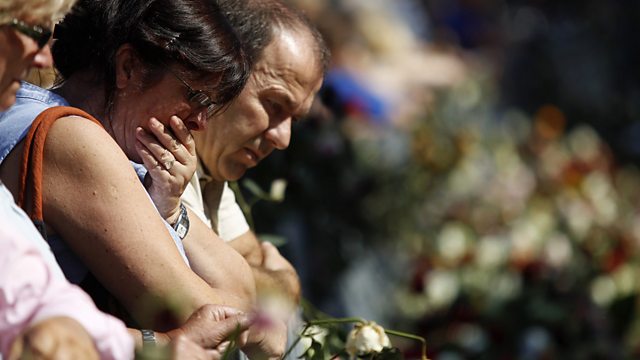03/08/2011
Helping Norway's massacre survivors deal with psychological trauma; Unprecedented rises of obesity in emerging countries; A new portable blood test which can diagnose multiple diseases within minutes.
NORWAY MASSACRE SURVIVORS
Seventy seven people died as a result of the shocking events which took place in Norway on the 22 July 2011, and many more went through the trauma of witnessing the events. Mental health professionals are adopting a “watch and wait” approach. With evidence after 9/11 that rushing in hoards of counsellors might have hindered, rather than speeded recovery for some individuals, the thinking about offering everyone counselling after traumatic events has changed. In Norway survivors will be offered help, but only if they are still experiencing symptoms after a month. It is assumed that not everyone will need it. Jennifer Wild is a consultant clinical psychologist at Kings College London and trains staff in Norway to treat post traumatic stress disorder. She begins by telling Health Check which symptoms are typical two weeks on from an event like this.
OBESITY RISES IN EMERGING COUNTRIES
New figures from the World Health Organisation show that alongside a rapid rise in their GDP, emerging economies have also seen a steep increase in obesity levels. These countries, some of which have struggled to feed their people in the past, are now faced with the opposite problem and an unprecedented increase in diseases such as diabetes. As part of a special World Service season, Pablo Uchoa from ����ý Brasil has been looking at the new data.
PORTABLE BLOOD TEST
The most reliable way to diagnose many diseases is through a blood test, which usually involves patients going to a clinic to have blood taken, then waiting while it is sent off to a lab for testing. This is not always easy in remote areas. Now a new credit card sized device called the mChip, can give you test results for multiple diseases within minutes, using just a pinprick of blood. It has been trialled in Rwanda and the results which have just been published in the journal Nature Medicine show that it is 95% accurate in diagnosing HIV and 76% accurate with syphilis. Dr Ruben Sahabo is the Rwanda country director for the International Center for Aids Care & Treatment Programs. Claudia Hammond speaks to him on the line from Kigali.
Last on
Chapters
-
Norway Massacre Survivors
Helping survivors of the Norway massacre deal with the psychological trauma of what they’ve been through. Claudia Hammond talks to psychologist Jennifer Wild
Duration: 06:55
Obesity in Emerging Countries
Unprecedented rises of obesity in emerging countries and its consequences. The ����ý’s Pablo Uchoa reports
Duration: 05:41
New portable blood test
A new portable blood test the size of a credit card. Claudia Hammond speaks to Dr Ruben Sahabo in Kigali, Rwanda
Duration: 04:12
Broadcasts
- Wed 3 Aug 2011 18:32GMT����ý World Service Online
- Thu 4 Aug 2011 03:32GMT����ý World Service Online
- Thu 4 Aug 2011 10:32GMT����ý World Service Online
- Thu 4 Aug 2011 15:32GMT����ý World Service Online
- Sun 7 Aug 2011 06:32GMT����ý World Service Online
- Sun 7 Aug 2011 23:32GMT����ý World Service Online
Podcast
-
![]()
Health Check
Health issues and medical breakthroughs from around the world.


